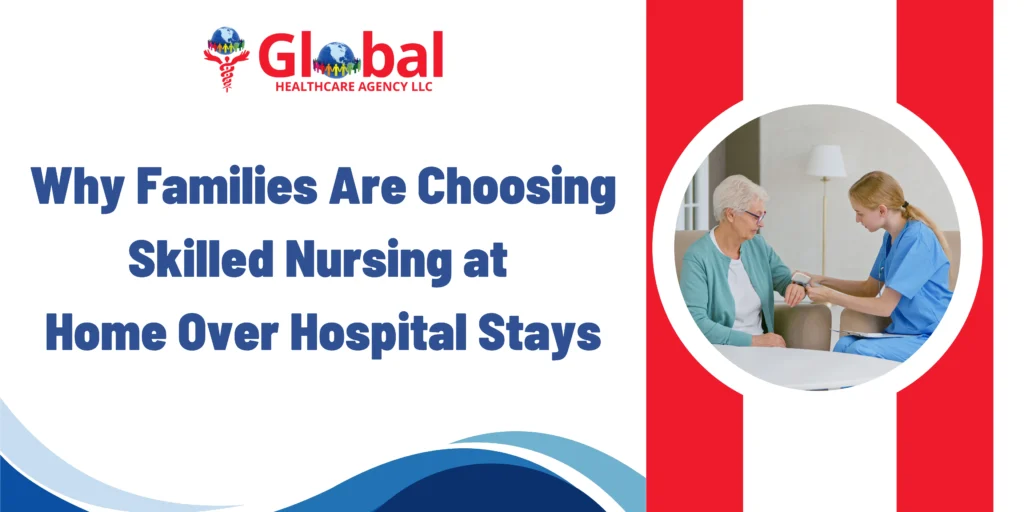As healthcare evolves, more families are recognizing the benefits of home nursing as an ideal alternative to hospital stay. Opting for skilled nursing at home over traditional hospital care stems from a desire for comfort, high-quality care, and a personal healthcare experience. Home-based skilled nursing allows patients to receive essential medical support within their own homes, enhancing both physical and emotional well-being.
The Rise of Skilled Nursing at Home
For many families, skilled nursing at home is a preferred alternative to hospital stay, especially for seniors with chronic illnesses or complex medical needs. By choosing skilled nursing at home, patients enjoy the benefits of home nursing, receiving comprehensive care while remaining in a familiar environment. This approach is growing in popularity as families seek greater control over their loved one’s care, prioritizing both comfort and personalized attention.
To learn more about skilled nursing services, visit Global Healthcare Agency’s Skilled Nursing Page.
Key Reasons Families Prefer Skilled Nursing at Home
1. Enhanced Comfort and Reduced Stress
One of the most significant benefits of in-home skilled nursing care is that it allows patients to remain in the comfort of their own homes. Hospitals can be intimidating, especially for seniors and those with chronic health issues. By receiving care at home, patients avoid the stress and anxiety often associated with clinical environments. Home is where patients feel most relaxed, which can lead to a smoother recovery and a more positive overall experience.
The emotional comfort that comes from staying in a familiar place can greatly contribute to the healing process, making skilled nursing at home a wise choice for many families.
2. Personalized and Continuous Care
Skilled nursing at home offers a level of personalization that is hard to achieve in a hospital setting. At home, caregivers can develop customized care plans that address the patient’s specific needs, preferences, and routines. This level of attention ensures that every aspect of care, from medication management to dietary needs, is tailored to the individual. Continuous, one-on-one support also fosters a close caregiver-patient relationship, which is essential for effective care.
For families interested in a more tailored approach to healthcare, private duty nursing can provide personalized care options suited to each patient’s needs.
3. Fewer Risks of Infections and Complications
Hospitals are environments where infections can spread more easily due to the close quarters and a high volume of patients with various conditions. By opting for skilled nursing at home, patients significantly reduce their risk of acquiring hospital-related infections. For seniors or those with weakened immune systems, this reduced exposure is crucial in maintaining health and avoiding unnecessary complications.
In-home care settings also provide a controlled environment, where family members can be involved in maintaining cleanliness and supporting the overall care process, ensuring their loved one’s safety.
How Skilled Nursing at Home Supports Independence
One of the most meaningful benefits of home healthcare for seniors is the sense of independence it allows. Patients are able to maintain a sense of control over their lives and daily routines. Unlike in hospitals, where schedules are rigid and activities are often restricted, in-home care provides patients with the freedom to make decisions and live according to their preferences. This independence is invaluable for mental health and emotional resilience.
For families seeking ways to help loved ones maintain independence, companion care services can be combined with skilled nursing for a comprehensive support plan.
Financial Benefits of Choosing Skilled Nursing at Home
1. Cost Savings Compared to Hospital Stays
Skilled nursing at home is often a more cost-effective option compared to prolonged hospital stays. Hospital bills can accumulate quickly due to fees for overnight stays, equipment use, and specialized treatments. With in-home care, families can manage costs more effectively. Home healthcare providers usually offer flexible and affordable options. These savings helps families focus on personalized, long-term care. It supports health and well-being without the financial strain of long hospital stays.
2. Flexibility in Payment Options
Many home healthcare services offer flexible payment structures, allowing families to choose services that align with their budget and care priorities. Insurance may cover some of the costs associated with in-home care, further enhancing its affordability. Families can work with healthcare providers to develop a care plan that fits both the patient’s needs and the family’s budget.
Explore home healthcare options for affordable care that meets a variety of health needs.
How Skilled Nursing at Home Fosters Family Involvement
Family involvement is a crucial component of effective healthcare, and skilled nursing at home provides a unique opportunity for families to take an active role in the caregiving process. Being at home allows family members to participate in daily care routines, monitor health progress, and support the patient emotionally. This close involvement not only strengthens family bonds but also ensures that care is delivered in a way that aligns with the family’s values and expectations.
For families looking to stay closely involved, Global Healthcare Agency offers guidance and support to make the caregiving experience fulfilling and empowering for everyone involved.
Making a Choice for Skilled Nursing at Home
The decision to choose skilled nursing at home over hospital stays prioritizes comfort, safety, and personal well-being. By opting for in-home care, families can ensure that their loved ones receive the highest level of care without sacrificing the familiarity and comfort of home. This choice also allows for a more flexible, affordable, and personalized approach to healthcare.If you’re considering skilled nursing services for a loved one, contact Global Healthcare Agency today to discuss how we can provide compassionate, comprehensive care at home.



